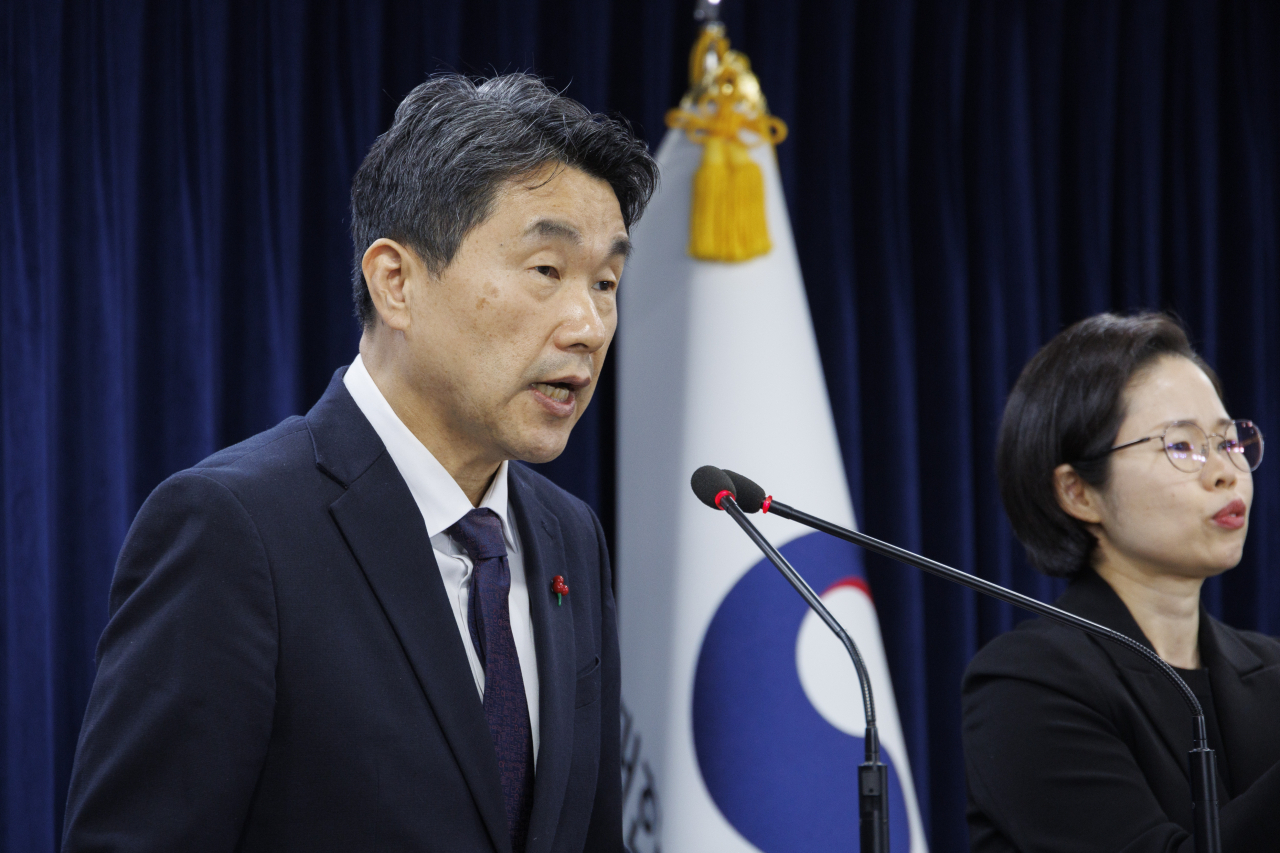2028 Suneung will 'aim to ensure fairness'
Korean college entrance exam to integrate subjects, adopt five-tier absolute grading system
By Choi Jeong-yoonPublished : Dec. 27, 2023 - 17:30

South Korea's Education Ministry confirmed changes for the college entrance exam starting in the year 2028 on Wednesday, largely by consolidating the test topics, aiming to "ensure fairness and stability" in the country's highly competitive education system.
Currently, the standard score for each test taker of the same subject might differ among those who got the same raw score, depending on their choices of elective topics for the subject, prompting questions about the test's fairness.
"The integration aims to resolve unfairness among Suneung scores that differed based on the subjects the student chose," Education Minister Lee Ju-ho said during a press briefing.
The major changes, to affect students who are ninth-graders next year, include integrating subjects under the five categories of Korean language, mathematics, social studies, science and vocational exploration. The decision to reduce the scope of the subjects comes after there were disparities in test scores based on the subjects the test takers chose.
Currently, the Suneung, or the college entrance exam, allows students taking Korean language and mathematics exams to choose which elective topics they wanted to take. Students had to choose one elective topic out of two in Korean and one out of three in math.
For instance, with common mathematics required for all, test takers had to select to take one test in probability and statistics, calculus or geometry. Now the ministry has said it will combine the two Korean subject tests into one test and the three math subject tests into one test.
As the Suneung evaluates students based on standard scores and not raw scores, previously, the final results after students took tests in different subjects differed even though, for instance, the two students got the same number of questions correct. As calculus and geometry were considered comparatively more "advanced" than statistics, students who selected the former subject categories would get higher standard scores despite their raw scores being the same as test takers of the statistics exam.
"The ministry expects the reform will practically integrate humanities and science fields and induce convergent learning based on basic knowledge in social and scientific studies," Lee said.
For the first time in 23 years, the textbooks and curricula that cover 17 electives for social and science studies will be integrated as well. The current nine social studies subjects, such as Korean geography, world geography, world history, economy and politics, will be integrated into one social studies test. The current eight subjects for science, such as physics, chemistry and biology, will be combined into one science test. A wider scope of subjects will assess students at the level of a first-year high school student, having all students take both the social studies and science tests in 2028.
Until now, students taking the Suneung could choose up to two subjects from a total of 17 subjects. Those wishing to enter the humanities and social sciences at universities usually took two social studies and two sciences for the natural sciences, engineering or even medical schools. The ministry will roll out sample questions in the new format next year at the earliest to help students grasp the upcoming exam questions.
High school students in the 2025 academic year will also see changes in the grading system for internal school assessments that can also count toward admissions. Intended to ease competition, the five-tier absolute grading scale from A to E -- a mode of grading where grades are given based on predetermined cutoff levels will be adopted.
As of now, school tests are based on a relative grading system that sorts all students into nine groups for each subject, with only those who make it into the top tier getting admission to prestigious universities. Currently, only 4 percent of students can get into rank 1, equivalent to an A+.
However, both absolute and relative evaluation systems will be recorded in report cards for Korean language, English and mathematics, with the aim to ensure fairness and help universities to assess the level of students in an accurate manner. With the five-tier system, the top 10 percent of students can get into rank 1.
"The current nine-grade system, with only 4 percent of students in the first tier, has created excessive competition in the classroom. Also, with the decreasing number of students in some regions, the nine-grade system has made it hard for students in small schools and small classes to rank in the top tier," the minister explained.
The ministry added that the new evaluation method places a heavy emphasis on creating a more diverse learning environment where students can learn how to collaborate and communicate with each other in class instead of competing and comparing themselves against peers for higher grades.
The education authority also underlined the importance of students having the option to study what they are interested in, not determined by the possibility of admission of universities.
As the ministry is mandated to notify the public of major changes to the country’s education system four years in advance, as stipulated in the current Higher Education Act, the basics and specific details on the 2028 college entrance examination will be announced as early as the end of August 2025 and the implementation plan by the end of April 2026.





![[Weekender] How DDP emerged as an icon of Seoul](http://res.heraldm.com/phpwas/restmb_idxmake.php?idx=644&simg=/content/image/2024/04/25/20240425050915_0.jpg&u=)



![[Music in drama] An ode to childhood trauma](http://res.heraldm.com/phpwas/restmb_idxmake.php?idx=644&simg=/content/image/2024/04/25/20240425050929_0.jpg&u=)








![[Herald Interview] Mistakes turn into blessings in street performance, director says](http://res.heraldm.com/phpwas/restmb_idxmake.php?idx=652&simg=/content/image/2024/04/28/20240428050150_0.jpg&u=20240428174656)
